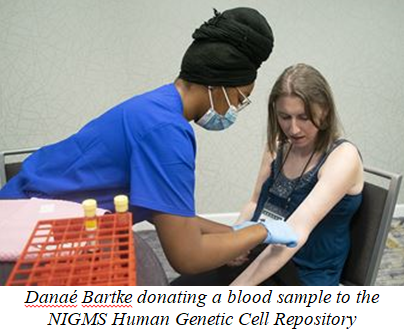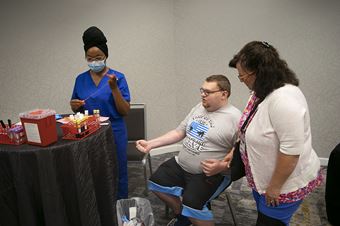The NIGMS Repository Team prides itself in its extensive collaborations with Rare Disease advocacy organizations, helping to strengthen the tie between these communities and scientific researchers. By working hands-on with patient foundations, the NIGMS Repository supports individuals affected with rare diseases and their families to participate in scientific research opportunities.
Organizations that advocate for patients with rare diseases have a lot on their plates. Their leaders—individuals often affected by these diseases in some way—wear many hats. They become quick experts in genetics, fundraising, community building, and the needs of researchers working to better understand these disorders and develop new therapies.
When it comes to collecting biosamples for research—often one of the most important requirements of scientists—Coriell can help shoulder that burden.

Danaé Bartke is the executive director of HCU Network America, an advocacy group for individuals with homocystinuria (or HCU). The homocystinurias are a collection of heritable metabolic disorders that can cause serious symptoms affecting the eyes, brain, skeleton, and vascular system. The most common disorder in this group is called classic homocystinuria, the disorder with which Bartke herself has been diagnosed.
HCU Network America recently held their third annual family conference in Bethesda, Maryland, this year in cooperation with fellow advocacy groups Organic Acidemia Association and Propionic Acidemia Foundation.
One priority of HCU at this year’s event: collecting blood samples from patients and affected family members so researchers have the biomaterials they need to develop therapies.
“One of the first questions we get from researchers is ‘Do you have a biobank?’” Bartke said.
This is what led Bartke to Coriell and the NIGMS Repository. This collection of biosamples at Coriell contains cell lines and DNA representing a wide range of heritable diseases and is always working to add more.
“Our organization’s president, Margie McGlynn, learned about the collection in a conversation with someone in leadership at Coriell,” Bartke said. “We were thrilled to learn that so much of the cost is covered by the collection itself and we reached out to the team at Coriell right away.”
At this year’s event, a Coriell team working for the NIGMS Repository was on site to present information about the collection, the importance of building a biobank, and to answer any questions from families interested in donating. They also arranged everything needed so patients and their family members could have their blood drawn at their convenience. Biobanking can be a complicated and expensive initiative for advocacy groups. The NIGMS Repository makes is free for users to contribute and its samples are available to scientists around the world for a low cost.
 “As a patient, you hear about repositories where researchers have to pay high prices for samples, and as a patient, we’re giving part of ourselves to it. We want these samples to be available widely,” Bartke said. “Coriell makes it affordable.” At Coriell’s booth, families involved in HCU Network America as well as those present from the Organic Acidemia Association and Propionic Acidemia Foundation could have their blood drawn free of charge. For Bartke, a main organizer of the weekend’s event that included families from as far away as the United Arab Emirates, this was one less thing off of her plate.
“As a patient, you hear about repositories where researchers have to pay high prices for samples, and as a patient, we’re giving part of ourselves to it. We want these samples to be available widely,” Bartke said. “Coriell makes it affordable.” At Coriell’s booth, families involved in HCU Network America as well as those present from the Organic Acidemia Association and Propionic Acidemia Foundation could have their blood drawn free of charge. For Bartke, a main organizer of the weekend’s event that included families from as far away as the United Arab Emirates, this was one less thing off of her plate.
“The blood draw was one of the things I had to work on the least. Coriell did their own presentation, they had their own booth, they hired and brought their own phlebotomist,” she said. “It’s great that Coriell makes it so easy.”
Her pitch to families interested in contributing was simple.
“You donate blood one time and you’ve contributed to this vast wealth and future that can improve things not just for yourself, but all patients,” Bartke said. “If we’re ever going to have a better understanding and develop better therapies for our diseases, we all need to be in this together. Not just researchers, not just the pharmaceutical industry bringing these therapies to market. It’s everyone working together to make it happen.
If you work with a patient advocacy group and would like to learn more about sample collection, Coriell would love to hear from you. Please reach out to NIGMS@coriell.org.